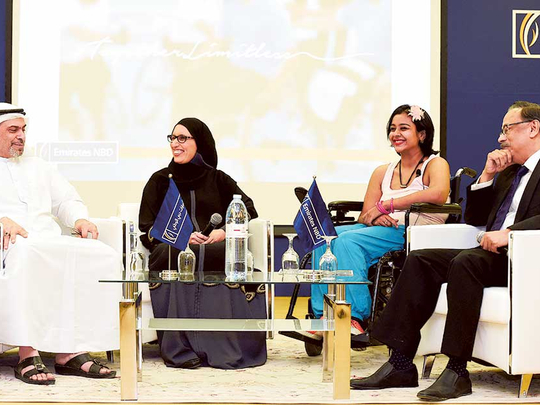
Dubai: Eight out of 10 people with disabilities have some degree of a relationship with a bank in the UAE but most continue to face challenges carrying out transactions, a research done by Emirates NBD Bank said on Wednesday.
While going to the bank to carry out a transaction may be a mundane task for many people, it can be a challenge for those with disabilities.
The recent survey, which included 225 people with disabilities under the platform ‘#Togetherlimitless’, showed that the most common challenges include mobility difficulties, staff attitudes and lack of access to bank services.
“A business cannot consider itself truly successful unless it is able to support and empower the disadvantaged,” said Husam Al Sayed, Group Chief Human Resource Officer at Emirates NBD. He pointed out the need for more banks to support the ‘My Community’ initiative launched by Shaikh Hamdan Bin Mohammad Al Maktoum, Crown Prince of Dubai and Chairman of Dubai Executive Council, that aims to transform Dubai into a disability-friendly city by 2020.
The survey findings showed that the type of challenges encountered varied depending on the type of disability.
For the visual and hearing-impaired, the lack of access to assistive technology in ATMs and bank websites proved a challenge. While dealing with untrained bank employees who did not understand their condition or trust them to make their own financial decisions was listed as another common challenge.
Physical challenges for people with mobility disabilities included difficulty in entering buildings, lack of appropriate facilities such as lowered cash counters and accessible toilets, lack of ATM with lowered height, and inaccessible doors and elevators.
“Differently abled people have different needs and expectations from a bank that have to be addressed differently. Only a thorough understanding of the needs and expectations of individuals with disabilities will help us create an experience that is easy and frictionless, and help us develop banking products, processes and services that truly address everyone’s needs,” Suvo Sarkar, Senior Executive Vice President & Group Head — Retail Banking and Wealth Management, Emirates NBD, said at a panel discussion at Al Noor Training Centre on Tuesday.
The survey findings also found that people with disabilities are generally confident in managing their finances and do so daily on their own. However, when it comes to various banking channels, respondents rely heavily on more conventional modes of banking, preferring branch and ATM visits to online and mobile banking channels.
“Financial inclusion is very important for a community to progress. No one should feel left out. We are all humans at the end of the day, and we must all be a part of the same society,” said Shobhika Kalra, cofounder of Wingz of Angelz, an organisation working to enhance accessibility for those with disabilities.
Among the three groups — mobility, visual, and hearing impairment — people with hearing impairments were found to be the least confident in banking, showed the research.
“The financial inclusion of people with disabilities is a very important step towards ensuring everyone in the UAE can enjoy equal and fair access to financial services,” said Dr Muna Al Hammadi, Social Care Specialist of Community Development Authority. She explained that the banking sector, like any other sectors in the UAE, is required to adopt services and technologies to accommodate people with disabilities in order to help transform Dubai into a disability-friendly city by 2020.







